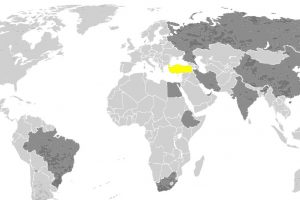The global agenda is concerned with the enlargement of BRICS, a non-formal economic organization consisting of Brazil, Russia, India, China, and South Africa. Though the group does not have an official status, it functions as an international organization and accepts or rejects memberships of applicant countries.
In August, South African President Cyril Ramaphosa announced at the 15th BRICS Summit that Iran, Argentina, Egypt, Ethiopia, Saudi Arabia, and the United Arab Emirates had been invited to join the bloc and the membership will take effect on January 1, 2024.
Aside from new members, 16 countries have formally applied to join BRICS while 16 others, including Turkey, have shown interest in the group. The increasing amount of interest attests to the popularity of the bloc, which attracts countries mainly from the Global South. With new members, BRICS will represent 46% of the global population, 29.3% of global GDP, 43.1% of global oil production, and 25.1% of global exports.
Why do countries want to join BRICS?
There are several reasons why the BRICS are attractive to certain countries. First, current members, future members, and other applicants are non-members of the Western bloc and generally disadvantaged against the U.S. and the EU in many respects. Among many such countries, there is a general understanding that the West tries to maximize its economic and political power and interests on account of the rest of the world. What is more, the maximization policies of the West are considered unfair and often morally questionable actions. Therefore, BRICS-like groupings are seen as a way to resist the destructive dominance of Western economies, best summed up perhaps by the phrase “United we stand.”
Western economic cooperation and organizations may be damaging to the BRICS economies, but they also inspire them to counter them. Indeed, the model of economic cooperation, namely the EU, introduced by the transatlantic alliance worked well after World War II, enriching Europeans. Thus, BRICS members are following Europe’s path to strengthen their economies; BRICS is an organization that both imitates Western institutions and counters them.
New members are not aligned to any bloc, making BRICS the only economic body they can approach. It is quite unlikely that Ethiopia, Argentina, or any Middle Eastern country will one day become an EU member—their best choice for economic cooperation is to be a member of BRICS.
Middle Eastern countries, particularly, tried their best to align with U.S. interests but were disappointed with Washignton’s policies towards them. No Middle Eastern country is willing to be satisfied with allying with the U.S., for example, against Iran and Israel. The example here is political, but politics affect economic relations and alliances. Moreover, new members and BRICS enthusiasts are ideologically closer to BRICS members than the West.
Will Turkey join the BRICS?
As for Turkey, being a BRICS member will bring economic benefits to the country. However, for all countries, including Turkey, economic alliances have political repercussions and are mostly formed according to countries’ political postures. As BRICS is an unofficial union formed by big powers of the Global South, Turkey’s membership would have the greatest consequences compared to any other membership.
To begin with, Turkey sees itself as a European country. While a small part of its territory is on the European continent, it has historical and political ties with Europe and has always turned its face to the West. The secular community which founded the country in 1923 distanced itself from the East (and South) arguing that Turkey should be in the Western bloc.
On the other hand, Turkey’s conservative democratic community, which now governs the country, is not fully aligned with the West nor is it anti-Western. In fact, it would welcome EU membership more than any other economic grouping. Currently, even though Ankara no longer maintains a full allegiance to the West and relations are not at a desired level with the U.S. and the EU, the incumbent government still wants to keep strong ties with both.
At the moment, Ankara prefers not to part ways with Western powers and, concurrently, improves relations with the rest of the world. While it tries to remain neutral in world politics on account of its NATO membership and EU candidacy, it does not want to change its axis completely. Turkey’s balancing policy can be tied to its “Century of Turkey” motto, referring to an independent foreign policy, which is more assertive and gives priority to the country’s own interests. Besides Turkey’s new foreign policy, being estranged by its Western allies compels Turkey to seek new cooperation opportunities. BRICS is not a political bloc and being a BRICS member does not mean an axis change. Yet, being a BRICS member does have political consequences.
Source: Politicstoday.org






